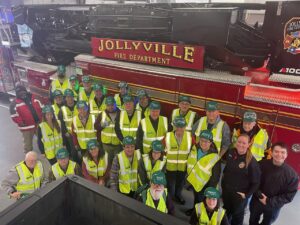Back-Up Power for Required Medical Equipment
May 23, 2024
This spring has already proven that central Texas weather is only getting more interesting. We thought the last few years of winter storms were interesting but then Mother Nature said, “Wait…there’s more” and threw a record number of tornados and hail storms at us! And with these storms comes power disruptions…some short, and some longer than we want to deal with.
Many residents in the area may need back-up power supplies for required medical care equipment. Some folks use battery storage units, others may use small back-up generators, both which will work fine as lone as you have a good supply of the required fuel source. And, when using fuel powered generators, they are to be used outdoors, with proper ventilation and distanced from anything flammable.
I also found this City of Austin Utilities program posted on Facebook and thought it may be another option for those in need. It’s called the Medically Vulnerable Registry and it is a way to identify households that have patients that require electrical equipment to sustain their health. I’ve pasted the link below:
While I think this program is very beneficial, with what we’ve seen over the last three years, I would also recommend to be prepared to be self sufficient for an extended period of time. This used to be a recommended minimum of two weeks but, with what we’ve already experienced, I think it would be prudent to double that, especially when it comes to required medical care equipment.
Stay Safe
Turn Around, Don’t Drown!!!!!
March 28, 2024
Sat through Meteorologist Troy Kimmel’s Weather Safety class last night and it was amazing! He reminded the class that central Texas is coming in to severe weather season so I thought it would be a good time to put out some weather safety newsletters…
Turn Around, Don’t Drown
Moving water is incredibly powerful. It only takes 4-6 inches of swiftly moving water to sweep a large vehicle off the road and downstream, taking along those inside. There are a few things you need to remember when a roadway is covered with moving water. One, you don’t know the depth of the water. You may drive right into a four foot deep river. Two, you don’t know the speed of the water. The faster the current, the more powerful the water and the easier it is to push your car off the roadway. Three, you don’t know if the roadway is still intact. The swift moving flood waters may have completely removed the roadway and, again, you’d be driving into a river. Four, you can’t see where the road is underwater. Just because you see where it comes out on the other side of the river, it doesn’t mean it goes directly there. The road may curve below the surface. This exact situation sank a local area fire department’s ladder truck a couple of years ago!
One of the most important rules there is during a roadway flooding event is DON’T DRIVE AROUND CONES OR BARRACADES! Those were put out for your protection. When you drive around one of these traffic safety devices, you are endangering not only yourself, but also the family or friends in the vehicle with you AND the firefighters, paramedics and law enforcement officers that have to rescue you. A couple of years ago, a sheriff’s deputy lost his life while searching for a missing person who drove into a CLOSED flooded roadway. Neither of those lives had to be lost. Think of a road closed with barricades like a “Bridge Out” situation. You wouldn’t drive past a “Bridge Out” sign because you know you’d could get hurt or killed. And please remember that a 4-wheel drive or an SUV is not a boat! Just because you have “4 x 4” on your dashboard does not mean your vehicle will survive a swift moving water crossing.
For your safety, your families safety and the safety of those of us who have to come fish you out of the river, please don’t drive into a flooded roadway. A little inconvenience is way better than the loss of your life or that of a loved one.
Another CERT Class Graduates!
January 22, 2024
The latest Community Emergency Response Team class graduated last week, ready to help the community during the next regional emergency! This was the second class hosted at Jollyville Fire Department led by City of Austin Councilwoman Mackenzie Kelly and Support Specialist Nolan Screen. If you are interested in learning more about the class, email Support Specialist screen at Nolan.screen@austintexas.gov.
A True Hero
December 17, 2023
Last week, we lost one of our own in Ukraine….Graham was a volunteer with our organization for years and then went on to enlist in the Marines to protect our way of life….
The articles below give some good information on his life and how he lived to protect others….he will be missed!
https://www.kxan.com/news/local/cedar-park-man-killed-by-fighting-in-ukraine/
https://www.irishtimes.com/ireland/2023/12/13/graham-dale-tributes-paid-to-irish-natural-born-hero-killed-fighting-in-ukraine/


